SUMMARY
This is AI generated summarization, which may have errors. For context, always refer to the full article.

I know Secretary Butch Abad personally. I once worked for a non-governmental organization that he helped establish (at the time, there were no Napoleses, and, the Marcos dictatorship, not the pork barrel, was the most pressing issue). I also joined Butch in a political movement that sought to change the political system ‘from within’ through mass-based parliamentary interventions.
In 1992, I campaigned vigorously for him as a senatorial candidate in the Salonga-Pimentel ticket. I was only in my early 20s back then and I looked up to Butch as a valuable mentor. Moreover, my first lessons on feminism came from Butch’s family and circle of friends: Congresswoman Dina Abad, Secretary Ging Deles and Secretary Dinky Soliman. To a very great extent, I owe my political awakening to these people.
And because I know Butch personally, I trust him. I trust that he is not the type to squander, much less plunder public money. But I am also aware that citizens are not supposed to trust political leaders in the same way that friends or family trust each other. In friendships and families, practically nothing is “unforgivable” but in the societal-political arena, there are always accountabilities and the mechanisms to exact accountabilities are (supposedly) always impersonal.
It is in this light that I forward certain propositions that not only question Butch’s (and the ruling administration’s) decisions and actions related to the DAP but might even challenge his trustworthiness as a political leader. Elsewhere, I have already written: I trust Butch but DAP is dangerous.
I begin with this disclosure because I would like to establish that my thoughts are those of a citizen trying to make sense of what nation-building is all about – what kind of nation needs to be built and what the best way is to build that nation. I am not writing from a partisan view. This article is not about crucifying or protecting Butch or anyone in the ruling administration. It is about a crucial point of debate that I feel has been neglected in the many public conversations on the DAP: Is there a place for transactional politics in transformational politics?
I have gleaned this point of debate from the varying standpoints that have emerged from the DAP controversy and even from the earlier PDAF controversy. I have come to the conclusion that at this very moment the debate is not whether transformational politics is more desirable than transactional politics because both pro-and-anti DAP proponents claim to hold the premise that they all want to transform Philippine politics and effect positive changes. Rather, the debate is whether or not transactional politics is a necessary and effective route towards transformational politics.
Put another way, does the end justify the means?
In reflecting on this question, I look back to a previous question that I raised during the height of the PDAF scandal: should PDAF be abolished or simply reformed? I thought that question was important because of the claim that PDAF only needed to be reformed and put in the right (clean) hands because the benefits of the so-called development funds were much-needed and palpable. I argued that what may seem beneficial to some is actually detrimental to the larger society because these benefits only promote patronage politics. I further argued that patronage politics undermined the possibilities for the institutionalization of political and development processes that can better assure that benefits are more inclusive (i.e not limited to political allies/voter-supporters) and more rationalized (i.e hindi ang pirma ni ‘Cong’ ang pinakamahalagang basehan).
Malacañang has again claimed that DAP is beneficial, or at least 91% of it. It further claims that it “cannot vouch” for the 9% that went to 20 senators in 2012. And there’s the rub: why not? Weren’t these funds meant for a specific purpose (growth acceleration)? When Malacañang handed over these DAP funds to those senators, was this purpose not clarified or agreed upon? Why did they transfer the funds if they were not sure that indeed it would be used for growth acceleration (or to “help constituents” as Spokesperson Lacierda once framed it)?
Privatizing what’s public
To me, the PDAF and DAP both fall within the realm of transactional politics because both “privatized” what should have been “public” exchanges. In the PDAF case, the funds fell into the hands of legislators (the supposed people’s representatives) even while it was not their mandate to administer such funds. In the DAP case, the funds fell into the hands of the “higher-ups” even while social priorities (like growth acceleration) are supposed to be subjected to political decision-making that rests only on the legislative branch.
Both PDAF and DAP are clear cases of political overreach because in both cases, institutional checks and balances were messed up. Both subjected public funds to “private dealings” and to me, this is why both PDAF and DAP are dangerous – they did not go through the proper, publicly-mandated political processes. To ask whether the funds were put to good use and not for pay-offs is, in fact, a valid and not a “malicious” question. Since they “privatized” these funds, their private agreements should also be scrutinized: So, what exactly did they exchange behind our backs? Corona’s impeachment? The RH law? While I have no evidence of these exchanges (and perhaps none of us will ever know), I will still insist on this point: the question is valid, not malicious. Transactions, after all, always come with costs.
Moreover, both PDAF and DAP involved large sums of money (billions) and concentrated these monies into “hands” rather than into transparent processes. It thus should not surprise us that Napoles found her way both to PDAF and DAP. As most of us now know from the Napoles controversy, corruption thrives in the dark and can only be arrested/prevented if public transactions are made in the light of day.
Focus on legality
Those who have defended the DAP say that it is acceptable even desirable on two conditions. One, if it is legal. Two, if it is in the right hands. The establishment of legality (and technicality) is important because legality, to some degree, dispels or mitigates culpability. Conversely, the establishment of illegality, points to culpability. And it is indeed important to establish where culpability lies in this case.
The focus on legality, however, is insufficient because it sweeps under the rug the larger, equally important political questions: Do we not want to stop transactional, patronage-based politics? Is it not really possible to make public exchanges ‘public’? Is it not really possible to rally support for executive programs through institutional means like party politics rather than through wheeling-dealing and horse-trading of individual politicians?
The second point – DAP is good if it is in the right hands – also doesn’t hold water if the larger scheme of things is to be considered. As I have mentioned earlier, public funds should not be in “hands” because doing so has the effect of “privatizing” these funds rather than making them transparent. Moreover, it has been argued that those monies are better placed in the hands of reformers rather than in the hands of an institution (Congress) where majority are clearly concerned only with pork and elections and not with reform programs.
This argument leads to a circuitous debate because it begs the question: How then are we supposed to build institutions? While the current Congress can hardly be characterized as genuinely democratic or representative, the fact remains that by its very nature, it has democratic potential. Private exchanges, meanwhile, do not and will never have that potential.
This is why I maintain that institutional arrangements rather than private exchanges be made the norm rather than the exception. We need to build institutions because only through institutions and institutional arrangements can public exchanges be truly made public. We need to learn to trust institutions and not just people. We do not need to “personally” trust in each other, rather, we need to elevate the level of social trust in our institutions and in the people that constitute these institutions. We are already such a divided nation. Elevating that level of social trust may be a crucial step in making our nation less divided and more cohesive.
Aquino’s failure
To me, this is where the ruling administration has failed: While it has shown that it is composed of good people and has good intentions, it has not strengthened the trust of citizens in our democratic institutions and has in fact further corroded our already-damaged institutions.
I concede that there are many good people in this government and that even the PDAF and DAP had some reform-oriented goals, but the decisions and actions of this government, especially those related to the PDAF and DAP, have practically obliterated what little trust I have, as a citizen, in our institutions. And I suspect that there are many like me who have lost trust in our bureaucracy and in our Congress, perhaps even in our Supreme Court. While these institutions are not in crisis and our political system continues to be relatively “stable,” clearly, there is a crisis in the people’s trust in our institutions (i.e there are too many doubts and unanswered questions).
And so, I go back to my original question: Does the end justify the means? Talaga bang kinakailangang “madilim” ang daan tungo sa daang matuwid? Is it really too much to demand for political reality to reflect rather than run counter to political rhetoric? For word and deed to be consistent? For aims and means to be compatible?
A colleague once criticized me for being “too idealistic” and said that “if I wanted consistency in politics, I should stick to philosophy.” I have pondered on this criticism for the longest time and have come to this conclusion: there is no singularly correct philosophy but philosophy (principles, ideology) must inform and shape politics. I think it is high time that we let ideas rather than people dominate our political landscape.
If we continue this path of politics-without-philosophy, I’m afraid our prisons will always be filled with people who are declared crooks one day and then elected into public office the next day. And Philippine politics will never go beyond “weather-weather lang yan” and will always be simply about the rise and fall, the fortunes and miseries, of our politicians. It will never be about us, citizens. It will always be just an entertaining, gripping telenovela: abangan ang susunod na kabanata. Can someone please change the channel? – Rappler.com
The author merely wishes to be identified this time as a Filipino citizen.
Add a comment
How does this make you feel?
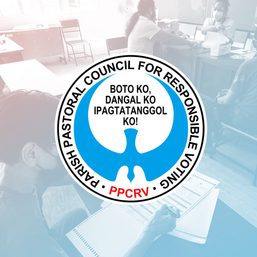



![[PODCAST] Beyond the Stories: Ang milyon-milyong kontrata ng F2 Logistics mula sa Comelec](https://www.rappler.com/tachyon/2021/11/newsbreak-beyond-the-stories-square-with-topic-comelec.jpg?resize=257%2C257&crop_strategy=attention)
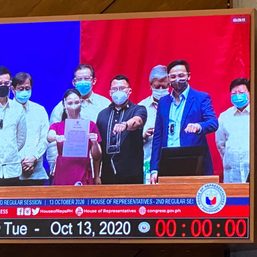
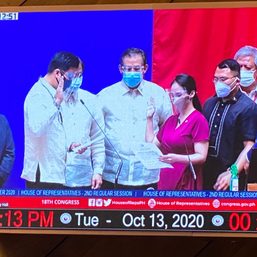
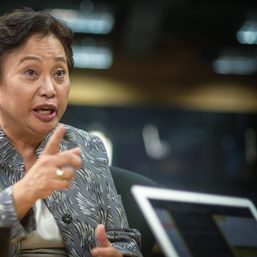
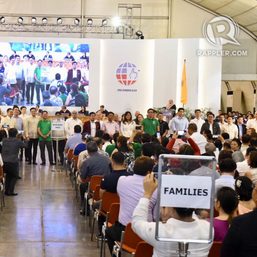
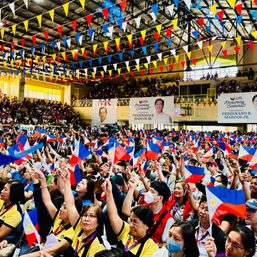
![[EDITORIAL] Ang low-intensity warfare ni Marcos kung saan attack dog na ang First Lady](https://www.rappler.com/tachyon/2024/04/animated-liza-marcos-sara-duterte-feud-carousel.jpg?resize=257%2C257&crop=294px%2C0px%2C720px%2C720px)
![[Free to disagree] How to be a cult leader or a demagogue president](https://www.rappler.com/tachyon/2024/04/TL-free-to-disagree.jpg?resize=257%2C257&crop_strategy=attention)
![[OPINION] Can Marcos survive a voters’ revolt in 2025?](https://www.rappler.com/tachyon/2024/04/tl-voters-revolt-04042024.jpg?resize=257%2C257&crop=251px%2C0px%2C720px%2C720px)
![[Edgewise] Quo vadis, Quiboloy?](https://www.rappler.com/tachyon/2024/03/quo-vadis-quiboloy-march-21-2024.jpg?resize=257%2C257&crop_strategy=attention)


There are no comments yet. Add your comment to start the conversation.